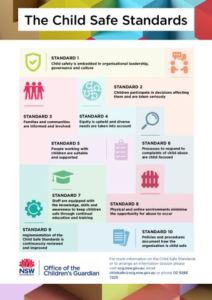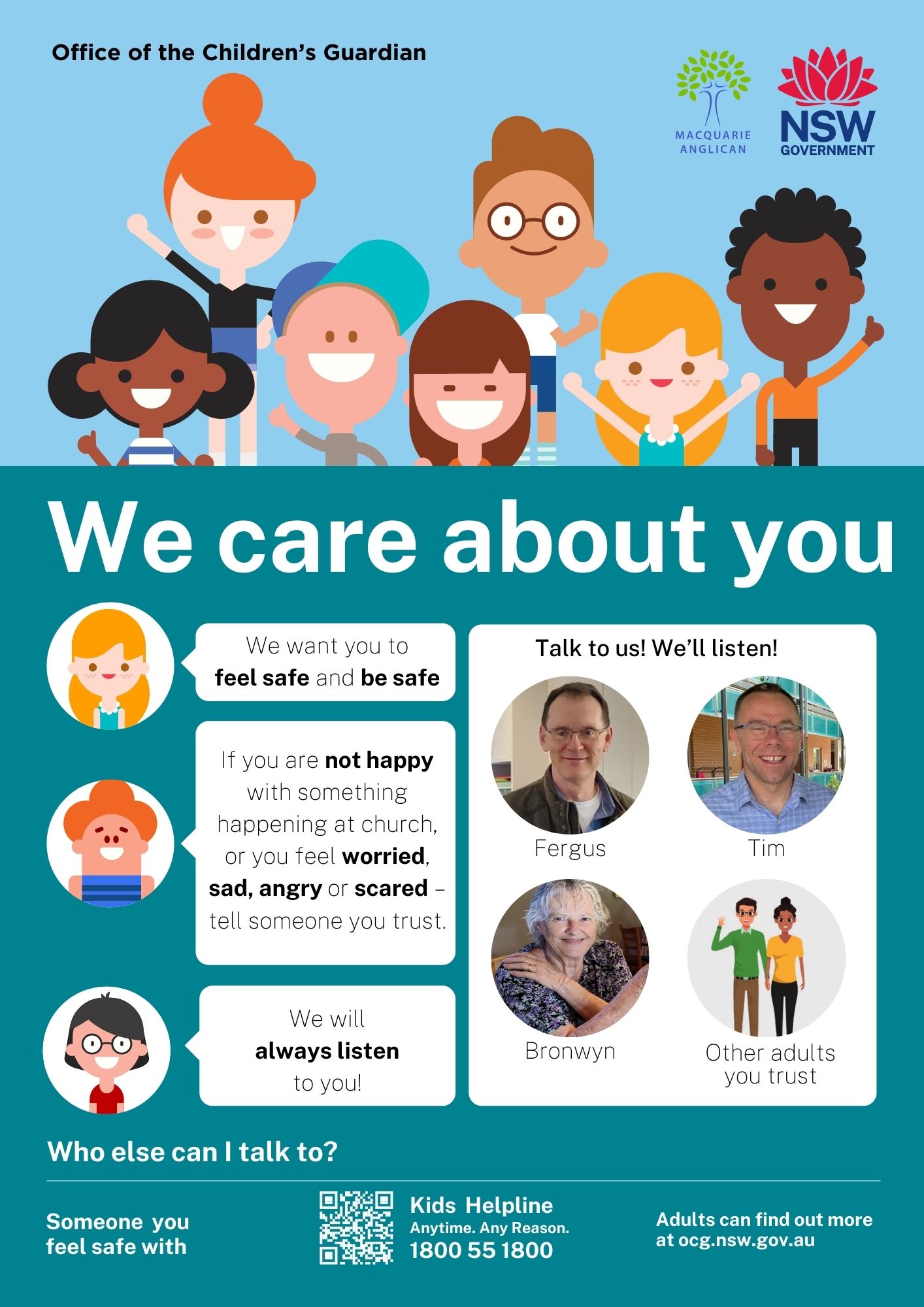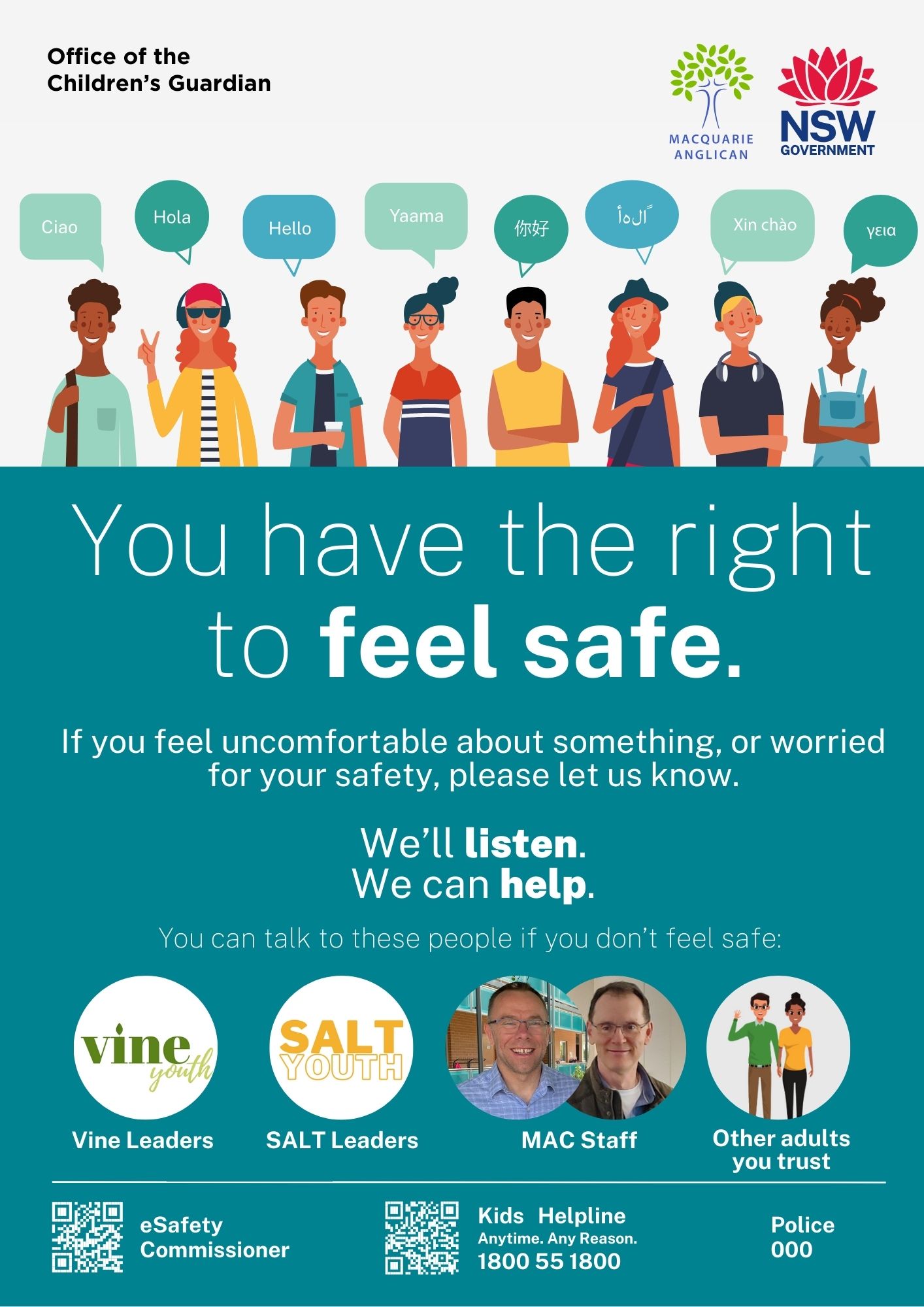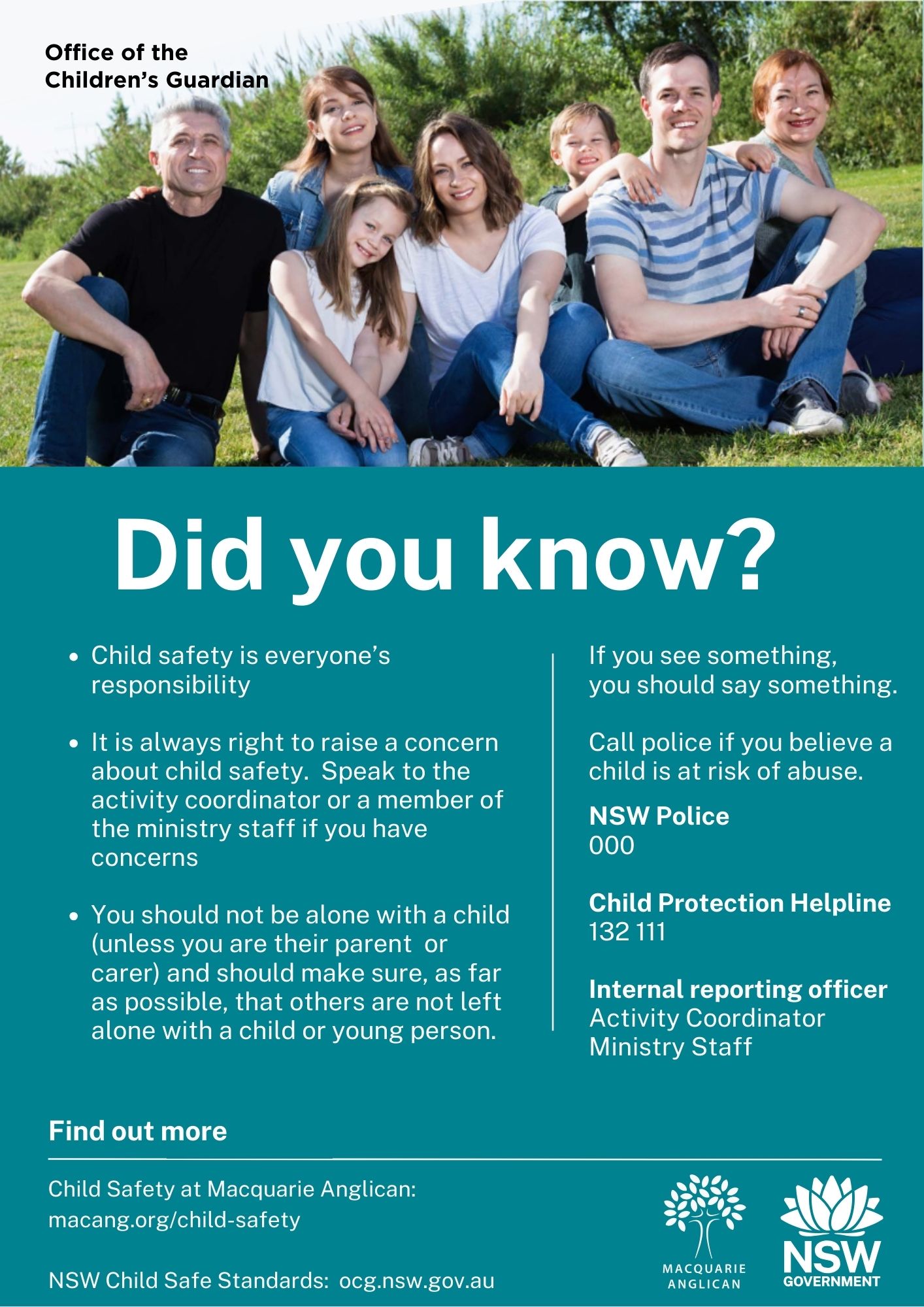Our Commitment to Child Safety
Macquarie Anglican Church is committed to doing everything we can to ensure the physical, emotional and spiritual welfare of all who participate in our activities. A high standard of behaviour and safe practice is expected of all members of our church, particularly those appointed to work with children & youth.
Three key documents helpfully inform our child safe policies and practices and provide a framework for ongoing review and improvement:
 Faithfulness in Service is the national code for personal behaviour and the practice of pastoral ministry by clergy and church workers (including volunteers) in the Anglican Church of Australia. Faithfulness in Service has been adopted by the Synod of the Anglican Church of Australia in the Diocese of Sydney – of which we are a part.
Faithfulness in Service is the national code for personal behaviour and the practice of pastoral ministry by clergy and church workers (including volunteers) in the Anglican Church of Australia. Faithfulness in Service has been adopted by the Synod of the Anglican Church of Australia in the Diocese of Sydney – of which we are a part.
 The Safe Ministry Blueprint localises and applies Faithfulness in Service to the Sydney context. It details the child safe policies and procedures required in the Anglican Diocese of Sydney. We receive advice, training, and accountability in implementing these through the Office of the Director of Safe Ministry (ODSM).
The Safe Ministry Blueprint localises and applies Faithfulness in Service to the Sydney context. It details the child safe policies and procedures required in the Anglican Diocese of Sydney. We receive advice, training, and accountability in implementing these through the Office of the Director of Safe Ministry (ODSM).
 The Child Safe Standards are a set of 10 standards required by the NSW Office of Children’s Guardian in response to the Royal Commission into Institutional Responses to Child Sexual Abuse. Organisations under the Child Safe Scheme must demonstrate their commitment to child safety by having child safe systems, policies and processes based on the Child Safe Standards.
The Child Safe Standards are a set of 10 standards required by the NSW Office of Children’s Guardian in response to the Royal Commission into Institutional Responses to Child Sexual Abuse. Organisations under the Child Safe Scheme must demonstrate their commitment to child safety by having child safe systems, policies and processes based on the Child Safe Standards.
Our Child Safe policies and procedures
Inclusivity Policy
Jesus said “Let the little children come to me, and do not hinder them” (Luke 18:16).
Jesus welcomed all children (and youth!) and so do we! We seek to offer programs with age appropriate content and activities. We use a variety of techniques to communicate concepts and stories such as visual (pictures & video), auditory (songs, rhythm), physical (actions, drama) and tactile (craft, writing). Our groups meet in fenced properties, with accessible access. All Children and Youth are welcome to join us. Where special provision is required, we seek guidance from caregivers, and do our best to facilitate needs.
Code of Conduct
We take the leadership of children and youth very seriously. We expect our leaders to be above reproach in their whole lives, with lives full of integrity and faithfulness, above and beyond what the law demands.
Faithfulness in Service is the National Code of Conduct of the Anglican church of Australia and has been adopted by the Synod of the Diocese of Sydney. It provides clear guidance as to the particular expectations and practices to which ministry leaders are to conform not only in ministry settings, but also in personal conduct.
The Code of Conduct for Children’s and Youth Ministry (Chapter 5 in the Safe Ministry Blueprint) applies the expectations of Faithfulness in Service to the particular context of work with children and youth.
Combined, these documents form our code of conduct.
Risk Management
The Guidelines for Children’s and Youth Ministry Activities (Chapter 6 & 7 in the Safe Ministry Blueprint) outlines the practical steps we take to manage risk by ensuring best practices and a safe environment in our programs. The guidelines include policy concerning the supervision of activities, transportation, and appropriate communication (including Social Media) to name a few. Three “golden rules” of risk management are relevant to all guidelines:
- Two or More: There should always be two leaders aged 18 years or over present for all children’s and youth ministry events.
- Never Alone: Leaders should not be alone with a child during an activity, and should make sure, as far as possible, that other leaders are not left alone with a child or young person.
- Stranger Danger: Leaders should be on the alert for people wandering around – a person unknown to the leaders or not part of the children’s or youth ministry should not be allowed access to children or youth.
Leader Recruitment
Following a process of application, training and approval, leaders are selected and appointed by the Senior Minister. There are requirements under both NSW law and the Anglican Church’s ordinances that must be met before a leader can be appointed. The Selection and screening of leaders process is detailed in Chapter 4 of the Safe Ministry Blueprint. In short, leaders are required to:
- Hold a current clear Working with Children Check (WWCC)
- Complete a Safe Ministry Check (lifestyle and background questionnaire)
- Regularly undertake Safe Ministry Training
- Read, understand, and comply with Faithfulness in Service
Special Religious Education (SRE) teachers have the following additional requirements:
- Undertake initial and annual SRE Accreditation Training
- SRE Authorisation from Rector
- Provide a Criminal Conviction Declaration Form
- Receive annual lesson observation
Complaints or Concerns
Concerns or complaints about activities or individuals associated with Macquarie Anglican should in the first instance be reported locally to the:
- activity coordinator or
- Senior Minister (Fergus Semler).
Alternately, if the complaint involves the senior minister or for any other reason seems inappropriate to raise with parish leadership, you can contact
- the local Safe Ministry Officers (Jeff & Anne Willey) or
- the Office of the Director of Safe Ministry
Concerns and complaints involving suspected child abuse or certain types of alleged conduct have mandatory reporting obligations under the Children and Young Person’s (Care and Protection) Act 1998 and the Reportable Conduct Scheme under the Children’s Guardian Act 2019 (detailed in Chapter 8 of the Safe Ministry Blueprint).
Reporting known concerns is also mandatory under law, as it is a criminal offence for any adult in NSW who “knows, believes or reasonably ought to know” that a child has been physically or sexually abused to conceal such abuse by failing to report it to the authorities.
In summary, the following organisations are notified in these situations:
- Department of Communities and Justice [Child Protection Helpline 132 111] – Children or Youth at risk of significant harm
- Police [000] – situations where an imminent threat requires emergency assistance
- NSW Office of the Children’s Guardian – allegations of certain types of conduct


